#Russian Colonialism 101
Explore tagged Tumblr posts
Text

Illustration from Russian Colonialism 101 by Maksym Eristavi. Published by IST. Illustration by Nikita Kravtsov.
#Ukraine#Russian Colonialism#Ukrainian artists#Ukrainian writers#Nikita Kravtsov#Maksym Eristavi#Russian Colonialism 101#art#wartime art
22 notes
·
View notes
Text
Moldova on Sunday marked the 15th anniversary of the so-called “Twitter Revolution” when the Communist regime of former president Vladimir Voronin was overthrown by mainly youthful protesters in Chisinau.
The Moldovan Presidency opened a photo exhibition featuring pictures of youngsters protesting against the then Soviet-type Communist leadership.
The name “Twitter Revolution” comes from the way messages in support of the protests were spread through Yahoo Messenger on the internet.
International media later named the protests the “Twitter Revolution”. It was the first time such protests had gone viral on social media. The so-called “Arab Spring” followed a few years later.
President Maia Sandu said the date April 7, 2009 remained an unhealed wound, recalling “the consequences of an authoritarian regime that imprisoned young people who think freely and which wanted to govern through fear, and feared its citizens.
“The young people who rose on April 7, 2009, suffered from the violence and terror of a regime that treated its citizens as enemies. The young people certainly experienced disappointments, but no one managed to destroy their dignity and moral strength to face injustice,” Sandu said on Sunday on her Facebook page.
However, Moldova’s former pro-Russian president, Igor Dodon, recalled the events with a lot less enthusiasm. Then part of the Communist Party, he declared that the uprising of April 7, 2009 had resulted in Moldopva becoming “a colony”.
“After 15 years, we still have a lot of misery, lies, migration … high prices, the transformation of the country into a foreign colony and a dictatorship that Voronin never dreamed of,” Dodon said on Sunday on his Facebook page.
The protests of April 7 2009 followed claims that the Communist Party had rigged the elections of April 5 2009, winning 60 seats out of 101.
The protest gathered thousands of young people in the centre of Chisinau demanding a more European future for Moldova. The then ruling Communist Party saw the country’s development as matching the Russian Federation.
The demonstrations in Chisinau were initially peaceful but took a violent turn when the protesters entered the parliament and presidency buildings and all but wrecked them.
The Communist leadership claimed that it was a coup orchestrated by the Western powers with the help of special services from Romania and Serbia.
The night after the protests, hundreds of young people were detained, tried and mistreated on the streets or in police stations. At least one young man, Valeriu Boboc, died.
Courts did little to bring offenders to justice. Ion Perju, a former policeman sentenced to prison for the murder of Valeriu Boboc, is still missing and was one of the few convicted for these violent acts. Perju has been wanted internationally since April 2015.
Alexandru Tanase, former Minister of Justice and former president of the Moldovan Constitutional Court, told the Ziarul de Garda newspaper on Sunday that the Twitter Revolution had lasting effects on Moldovan society whose importance cannot be underestimated.
“The Twitter revolution consigned to history an anachronistic government that claimed its identity in Soviet ideology, with which the construction of an independent state was unthinkable. The power that took over in 2009 was the first to change direction from East to West, radically.,” he said. “The first bricks in the foundation of Moldova’s orientation towards the European value space were built then,” he concluded.
3 notes
·
View notes
Video
youtube
Ear Candle Productions captures X-tal's Class Reunion at Rickshaw Stop, Camera 3, January 21, 2006. San Francisco band X-tal is captured during their reunion show at the Rickshaw Stop in San Francisco. The set list: Introduction by Li'l Mike
STATING THE OBVIOUS AGAIN
CENSUS
GOOD SHEPHERD
RAGAMUFFIN GIRL
ENCORE
MORE
FUN IN THE NEW WORLD ORDER
PABLO
BASICS 101
FIVE LEGGED SPIDER
WINDBAGS
UNION SUNRISE
AN OLD COLONIAL'S HARD LUCK STORY
BLACK RUSSIAN
The reunion lineup of X-tal was:
J Neo Marvin: Guitar, Vocals
Mark Zanandrea: Guitar, Vocals
Jimmy Broustis: Guitar, Vocals
Alan Korn: Bass
Mick Freeman: Drums, Vocals
Camera Davis Jones (Debra Nicholson Bassham)
Ear Candle Productions is a small music label, video production, and eLearning website. We also have a free, 24/7 global Ear Candle Radio program designed to bring creative ideas to the worldwide public at large. The owners of Ear Candle Productions are the creatives, John Bassham (AKA J Neo Marvin) and Debra Nicholson Bassham (AKA Davis Jones). We live in San Francisco. Come visit our website, check out our YT, Bandcamp, Ear Candle Radio, Internet Archive, and other pages at https://earcandleproductions.com
0 notes
Text
#independent #notmywar #on #westernfighterjetsforukraine .@nato @ot an .@bbc_whys .@bbcr4 .@peace @peace axiom is parity kills: howmany of semiclunkered jets are e f f e c t i v e enough surviveable enough sortierates included a g a i ns t which adversaries efforts: this lea ds to hedging any advantage adversary has not and against adversary c apabilites specialisation increasing effectivity against what while sur vivability inwhat leading to howlong howprecise what canbe aimed fro m where tobe effective against what this. is the 101 of airpower ukr aine themore adversary aa themore jam and sead themore cas as co re issue themore effetive munitions types and targettingpods themore adversary cas is problem themore frehunt and lookdown shootdown a must all per effectivity sortierates(allgroundsupport) and system surviva bility i f they get f16 and for crewtrain f16 only (groundsupport included) theyneed aesa radars jammers and sniping pods for m o v i n g groundtargets and m o v i n g lowaltitude adversary cas and for effec tive ammo types and thismeans they need what adversaryputs up 200 of th ese and a n o t h e r 200 cas rotary wing specialised undersame axio ms apache grade r u s s i a needs peace b e f o r e more russians die around february borders shortterm all russians outofukraine longt erm no natomembership which ukraine and west will effort and eu member ship of ukraine while russia mitigation of northkoreanisation all how west is kept together relies on nontinkered borders non warmethods when russia plays dirty it may game for make ukraine worthless as ag ricultural colony when ukraine feels unsupported and dares i d i o c y itwould falseflag trickery around these things instead (!)aiding west (!)against deception games: once ukraine starts being partoftheproblem of deceit its support basis is weakened for nogain btw and now y our best analysts say about jets: I am Christian KISS BabyAWACS - R aw Independent Sophistication #THINKTANK + #INTEL #HELLHOLE #BLOG ht tps://www.BabyAWACS.com/ [email protected] FluffyBunnySheepleSecurit [email protected] Helpful? support. donnate. pay. https://wise .com/share/christiank426 https://www.paypal.com/paypalme/christiankiss
#independent #notmywar #on #westernfighterjetsforukraine .@nato @otan .@bbc_whys .@bbcr4 .@peace @peace axiom is parity kills: howmany of semiclunkered jets are e f f e c t i v e enough surviveable enough sortierates included a g a i ns t which adversaries efforts: this leads to hedging any advantage adversary has not and against adversary capabilites specialisation increasing effectivity against…
View On WordPress
0 notes
Text

another author telling the same. his book Russian Colonialism 101 is not only illustrative of Russian colonial ideas but also a great way to support Ukraine and Ukrainian business as the whole publishing process is done in Ukraine. Help Ukraine and educate yourself here.

I genuinely don’t even know how to respond to this. (X)
344 notes
·
View notes
Text
ISLAM 101: SPIRITUALITY IN ISLAM: PART 117
The meaning of Tasawwuf
Last Part 12
Among the Sufis who aided Islam with the sword as well as the pen, to quote Reliance of the Traveller were: such men as the Naqshbandi sheikh Shamil al-Daghestani, who fought a prolonged war against the Russians in the Caucasus in the nineteenth century; Sayyid Muhammad ‘Abdullah al-Somali, a sheikh of the Salihiyya order who led Muslims against the British and Italians in Somalia from 1899 to 1920; the Qadiri sheikh ‘Uthman ibn Fodi, who led jihad in Northern Nigeria from 1804 to 1808 to establish Islamic rule; the Qadiri sheikh ‘Abd al-Qadir al-Jaza’iri, who led the Algerians against the French from 1832 to 1847; the Darqawi faqir al-Hajj Muhammad al-Ahrash, who fought the French in Egypt in 1799; the Tijani sheikh al-Hajj ‘Umar Tal, who led Islamic Jihad in Guinea, Senegal, and Mali from 1852 to 1864; and the Qadiri sheikh Ma’ al-‘Aynayn al-Qalqami, who helped marshal Muslim resistance to the French in northern Mauritania and southern Morocco from 1905 to 1909.
Among the Sufis whose missionary work Islamized entire regions are such men as the founder of the Sanusiyya order, Muhammad ‘Ali Sanusi, whose efforts and jihad from 1807 to 1859 consolidated Islam as the religion of peoples from the Libyan Desert to sub-Saharan Africa; [and] the Shadhili sheikh Muhammad Ma‘ruf and Qadiri sheikh Uways al-Barawi, whose efforts spread Islam westward and inland from the East African Coast … . (Reliance of the Traveller,863).
It is plain from the examples of such men what kind of Muslims have been Sufis; namely, all kinds, right across the board—and that Tasawwuf did not prevent them from serving Islam in any way they could.
To summarize everything I have said tonight: In looking first at Tasawwuf and Shari‘a, we found that many Qur'anic verses and sahih hadiths oblige the Muslim to eliminate haram inner states as arrogance, envy, and fear of anyone besides Allah; and on the other hand, to acquire such obligatory inner states as mercy, love of one’s fellow Muslims, presence of mind in prayer, and love of the Prophet (Allah bless him and give him peace). We found that these inward states could not be dealt with in books of fiqh, whose purpose is to specify the outward, quantifiable aspects of the Shari‘a. The knowledge of these states is nevertheless of the utmost importance to every Muslim, and this is why it was studied under the ‘ulama of Ihsan, the teachers of Tasawwuf, in all periods of Islamic history until the beginning of the present century.
We then turned to the level of Iman, and found that though the ‘Aqida of Muslims is that Allah alone has any effect in this world, keeping this in mind in everyday life is not a given of human consciousness, but rather a function of a Muslim’s yaqin, his certainty. And we found that Tasawwuf, as an ancillary discipline to ‘Aqida, emphasizes the systematic increase of this certainty through both mudhakara, ‘teaching tenets of faith’ and dhikr, ‘the remembrance of Allah,’ in accordance with the words of the Prophet (Allah bless him and give him peace) about Ihsan that “it is to worship Allah as though you see Him.”
Lastly, we found that accusations against Tasawwuf made by scholars such as Ibn al-Jawzi, and Ibn Taymiya were not directed against Tasawwuf in principle, but to specific groups and individuals in the times of these authors, the proof for which is the other books by the same authors that showed their understanding of Tasawwuf as a Shari‘a science.
To return to the starting point of my talk this evening, with the disappearance of traditional Islamic scholars from the Umma, two very different pictures of Tasawwuf emerge today. If we read books written after the dismantling of the traditional fabric of Islam by colonial powers in the last century, we find the big hoax: Islam without spirituality and Shari‘a without Tasawwuf. But if we read the classical works of Islamic scholarship, we learn that Tasawwuf has been a Shari‘a science like tafsir, hadith, or any other, throughout the history of Islam. The Prophet (Allah bless him and give him peace) said,
“Truly, Allah does not look at your outward forms and wealth, but rather at your hearts and your works” (Sahih Muslim, 4.1389: hadith 2564).
And this is the brightest hope that Islam can offer a modern world darkened by materialism and nihilism: Islam as it truly is; the hope of eternal salvation through a religion of brotherhood and social and economic justice outwardly, and the direct experience of divine love and illumination inwardly.
#allah#god#islam#muslim#quran#revert#convert#conevrt islam#revert islam'reeverthelp#revert help#revert help team#help#islamhelp#coneverthelp#prayer#salah#muslimah#reminder#pray#dua#hijab#]religion#mohammad#new muslim#new revert#new convert#how to convert to islam#convert to islam#welcome to islam
8 notes
·
View notes
Text
"The genii storyline is about American Russo hatred and their colonial..." No shit, Sherlock. The writers were pretty obvious with that satire, they discussed it openly at con panels, the choice of Genii uniform was explicitly chosen as creepy Bolshevik.
You have not unearthed some sinister subconscious bigotry from the writers of a scifi TV show. They told us directly, even the whole thing about the Genii using nuclear science irresponsibility and radiating their own people was a direct hit at the Russian history of doing EXACTLY THAT. They did it this month, in fact. Again. With their own soldiers.
Look, I get it's cool and fashionable to be kneejerk anti western in any way possible, but if your method of doing that is to simp for fucking RUSSIA, you need some critical thinking skills. Jfc, save us from the sanctimonious psych 101 analyzing
1 note
·
View note
Text
Just read some manifesto about how to write Latino characters.
The idiot kept talking about how they don’t speak Spanish (often) so because of that Latinos must also not speak Spanish that often…
The leap of logic and self-indulgence. Like admit it bro you just don’t speak Spanish lmao 😂. That’s perfectly fine. Not every Latino has to be Hispanic as in Spanish speaking some of us speak French or Chinese or Arabic or Portuguese but are still Latino it’s okay.
But living within a Hispanic community means that people within that community only speak Spanish or speak it idk 85% of the time?
It’s how immigration works. Go to any Korea town, Chinatown, Russian town, the people in those ethnic groups tend to speak in their native tongues and have businesses that cater to their people within their respective communities in their languages. It’s not even that hard to find in the real world.
Also code switching is a thing all immigrants do. African Americans do it when they slip into AAVE. Immigrants do it when they slip into their native tongues and they still switch into other versions when they speak with their relatives vs other members of their communities. Like the way I speak to my brothers and sisters for example is not the same way I would address my elders or church members or something like that just like co-workers. We have a lot of things in common. And I think that’s wonderful tbh 🥰
Like the case for most immigrant kids is like they go to school and try their best to assimilate because that’s what their parents tell them to do and fuck were bullied OD so society tells us to assimilate or perish tbh. So we do we just abandon our culture when we leave the house. But the minute we enter the house we switch back to the old ways and we HAVE TO speak in our native languages because that’s what our parents/grandparents speak in and understand. That’s literally it. You just learned immigration assimilation and integration 101 congrats 🍾🎉🎊.
OP didn’t even mention immigration at all… but somehow their Latinx???? 😭like okay imma have to take your card away sis. I’m not saying everyone is fresh off the boat like my green card ass having parents. I know some people who aren’t… and honestly fuck them they straight up turn into Republicans which is like the most fucked up shit. Not saying all but I don’t like it! The assimilation and integration went too fucking hard.
It’s crazy to me how some people who really live in a god damn bubble are given a fucking platform to be talking about shit they’re clearly not even apart of. I saw the post and I’m not linking to it because honestly it doesn’t need anymore notes. It has like 10k from both white and black people who don’t know wtf they’re talking about. It’s annoying as fuck. -_-
Like for the love of god, just ask a fucking Hispanic person what it was like to live. Like if you want to create an authentic story or character. Just ask someone from the community and ask them about their life. People love sharing stories, and now you have something that connects you to someone and to a whole community.
Instead of reading bullet points from some antisocial loser who probably doesn’t even leave their fucking room and their social interactions with other people within their community stops at the drive-thru window at their local Wendy’s. I can smell their dumbass little privilege.
Being the daughter of immigrants and being from the Bronx and also living in NYC forces me to be diverse. I can’t be ignorant about socializing unless I want to be a complete jackass. Like for real. If you’re closed off and xenophobic in New York it’s by choice… it’s definitely a reality for some people but not for me and I’m glad and blessed for that. 😩
And tbh OPs takes were too generalized and basic. Every Hispanic/latino whatever you wanna call us idc at this point is attached to our specific culture.
This mf didn’t seem to have one ☝️ it was just…
We don’t all speak Spanish and we don’t all eat tacos and burritos…. And I’m like…… okay first of all burritos are Tex-mex like technically they’re AMERICAN you ask any Mexican that and that’s what they will tell you. It’s not a Mexican dish but something created here like pizza or whatever.
Tejanos and Mexicans who lived in Texas and Arizona and what not, before the whiteys came and just manifest destinied that shit, (chicanos) had their own way of cooking that has changed over the years due to war, colonialism, and just good ol’ evolution. A lot of people forget that Mexico owned that area and people been living there and had been for generations. There’s a lot of history that’s been kind of stomped out, appropriated, and then white washed and then abandoned. It’s not really given the respect it truly deserves and it’s sad. I’m sorry guys that I don’t have any sources on this matter but I do know of a lovely book.
La Frontera/Borderlands: The New Mestiza
I think it’s a fantastic read and a great way to dust off your Spanish speaking skills and learn what being American means to some people. Chicanos are what I’m referring to when I’m talking about the Mexicans who were annexed after the Alamo and the Spanish war America had with Mexico. It’s not a perfect term tbh but it’s the best I can do lol.
God I’m so fucking hungry
I SMELL A RAT 🐀
Lmao 😂
It’s pathetic lmao. I hate you and you’re dumb lol. Not you reading this, the person who made that awful post about how to write a Latino that just boiled down to just slap a Latino title and don’t bother making them Hispanic (which means Spanish speaking) because why would that add anything to their culture or sense of identity lmao 🤣 musty ass bitch.
I’m not even Mexican bro and I felt the need the need to step in because you’re not just going to disrespect my friends like that.
I get mad because I had a lot of friends who were illegal, who were scared of being deported, of fucking graduating high school or even applying for college and outing their family.
Like these are real fucking people. They pay taxes, they laugh and create and dance and live along side us. I wish them health, wealth and safety tbh because a lot of people don’t. And it’s so heartbreaking to me because they’re culture is so gorgeous and worth paying attention to. It is literally right there. They have the connections to their ancestors. Like cmon now, everyone is always looking for something new. 😞
Oh and here’s a cooking channel! Fuck it why not!
Aquí estas doñita Ángela con sus dos hijas Brenda y Mary. Buen Provecho!
This lady OD cute and she make good ass food 🥰 she’s Mexican Mexican though not Chicano
youtube
#me#personal#dominican#african diaspora#latinx#Latino#writing#creating#character#character creation#culture#diversity#immigration#why diversity is needed#why you’re dumb#get out there and start asking people#don’t be listening to everything without questions shit#like Jesus#y’all need to read some books#something tells me this person isn’t even Hispanic tbh#like their shit was waaaay to basic#chicano#Mexicans#Mexican food#Youtube
4 notes
·
View notes
Link
...A DOJ warrant from Monday morning gives us much more detail about how the government actually secured the bitcoin funds. They did so by obtaining a warrant on a bitcoin wallet or exchange that had servers in Northern California. Yes, you read that correctly. The entity responsible for the ransomware attack did not in fact have custody over their bitcoin. Instead, they were using a custodian for their funds. It is unclear whether this account with servers in the United States is an FBI wallet or the affiliate’s wallet, but the major error in bitcoin 101 custody remains the surprising issue. Using a custodian for your funds instead of maintaining possession of them is a very basic error, especially for an allegedly sophisticated hacking gang.
...Anyway, the real issue here is how easily this could have all been avoided. It shows how horrifically poor our infrastructure is protected in this nation, to the point where a cheap ransomware attack by unnamed actors can result in a nationwide energy crisis.
The story has nothing to do with U.S. adversaries and digital currencies, but of unbelievable incompetence and neglect on the part of Colonial and our overall security apparatus. It's called *critical* infrastructure for a reason.
2 notes
·
View notes
Photo



OCS + BIOGRAPHIES
im pretending @fakefroot tagged me because i want to do this lol
im also tagging anyone who wants to talk about their ocs!
The Basics
Full Name: Raylan Grace NoLastName
Codename or Nickname: Captain, “Alex Hawthorne”, Cowboy, Raylan for short
Birth Date: May 15, 2257
Birth Place: Earth
Nationality: American
Organization/Group: The Unreliable Crew, Phineas’ Assistant, #1 Board Hater
Former Affiliates: Hope Colony, Celsior Research Labs
Family + Friends
Father: ¯\_(ツ)_/¯
Mother: ¯\_(ツ)_/¯
Siblings: feels like Pavarti and Felix’s older brother
Other Relatives: ¯\_(ツ)_/¯
Spouses: bachelor baybeee (though calls Vicar his husband to be annoying)
Children: none
Description
Height: 6′0″
Weight: 170lbs
Hair Colour: ash brown
Eye Colour: green
Skin Colour: olive tone
Any Scars: acid burns on his hands and forearms
Any Tattoos: smiley face on inside of his right wrist
Any Piercings: side nose hoop, helix
Other Notable Features: has oddly sharp canines
Random Facts: Phineas rescues him on his birthday :-) also he is a compulsive liar
///
The Basics
Full Name: Daytona Catherine Reed
Codename or Nickname: Day, 101, Sunshine
Birth Date: July 13, 2258
Birth Place: Capital Wasteland
Nationality: American
Organization/Group: Children of Atom, Megaton, Brotherhood of Steel
Former Affiliates: Vault 101
Family + Friends
Father: James Reed (deceased)
Mother: Catherine Reed (deceased)
Siblings: none
Other Relatives: Dr. Madison Li (adoptive aunt), Children of Atom congregation
Spouses: Butch and her are attached at the hip but it’s 1000% platonic
Children: she loves kids but doesn’t want her own!
Description
Height: 5′5″
Weight: 120 lbs
Hair Colour: dirty blonde
Eye Colour: blue
Skin Colour: white but tans in the wastes
Any Scars: bullet in her right shoulder, cuts on her palms from glass, deep jagged scar on her abdomen from a raider
Any Tattoos: an atom on the side of her left hand, along her thumb
Any Piercings: none
Other Notable Features: always has a baseball hat on
Random Facts: dogmeat’s always with her because he helps with her anxiety
///
The Basics
Full Name: Murphy Law
Codename or Nickname: Murph, Young Wolf, Guardian, Hero
Birth Date: december 13, ????
Birth Place: Old Russia
Nationality: Old... Russian?
Organization/Group: Vanguard, Fireteam Yippee Ki Yay
Former Affiliates: none
Family + Friends
Father: unknown (deceased)
Mother: unknown (deceased)
Siblings: none
Other Relatives: Church (ghost), Ikora Rey (space mom)
Spouses: none
Children: none
Description
Height: 5′7″
Weight: 150 lbs
Hair Colour: dark brown
Eye Colour: brown
Skin Colour: white with olive undertones
Any Scars: burns from left hip down (pre-raised)
Any Tattoos: cayde’s mark (spade) on her left wrist, revolver on her right wrist (matching tattoo with lyndesy)
Any Piercings: none
Other Notable Features: intense under eyebags because homie doesn’t know how to relax
Random Facts: buff as hell
#myocs*#apparently i said murph was 5'5 once but i take it back she's taller#her and raylan's family section is just ?????#raylan grace is his full first name but i don't want it hyphenated#these are my chaotic self sacrificing do-gooders#oc: capt hawthorne#oc: daytona#oc: murph
4 notes
·
View notes
Text
The Role of Science in Enlightenment Universalism

A Commentary on Susanne K. Langer on Scientific Civilization
When I wrote about Jacob Bronowski on scientific civilization I noted that the book in which Bronowski mentioned scientific civilization was about the history of science, not about civilization, but Susanne K. Langer’s 1961 essay “Scientific Civilization and Cultural Crisis” is a discussion of civilization that takes up the idea of scientific civilization in an explicit way:
“Science is the source and the pacemaker of this modern civilization which is sweeping away a whole world of cultural values. It is with good reason that we are meeting here to discuss the role of science in civilization; I would like to carry the issue a little further, and talk about the effect of this scientific civilization on human culture throughout the contemporary world. For it is not only in countries on which it has impinged suddenly and dramatically, but also in the countries of its origin—in Europe and America—that the technological revolution, with its entirely new mental and material standards, has deeply disturbed local and even national cultures.”
I have previously mentioned this essay by Langer in David Hume and Scientific Civilization, but at that time my ideas about scientific civilization were ill-formed and not yet clear. Now I am much better prepared to appreciate Langer’s essay. Many of the observations that Langer made in 1961 were to become commonplace decades later, so the essay is quite prescient, and there is quite a bit of it I can endorse, but there is also quite a bit that was equally prescient but with which I differ.
While Langer does not reference Oswald Spengler, there are Spenglerian aspects of the distinction she makes between culture and civilization. For Spengler, culture is the expression of a people in their youth, and it is only when culture becomes decadent that culture passes over into civilization, which is by definition the decadent phase of culture. Thus Spengler wrote:
“In this work, for the first time the two words, hitherto used to express an indefinite, more or less ethical, distinction, are used in a periodic sense, to express a strict and necessary organic succession. The Civilization is the inevitable destiny of the Culture, and in this principle we obtain the viewpoint from which the deepest and gravest problems of historical morphology become capable of solution.” (The Decline of the West, p. 31)
For Spengler, then, sequence culture–civilization is an invariant coupling of two periodizations that are found whenever a culture survives for a period of time sufficient to become a civilization. Langer does not go quite this far, but she does distinguish culture and civilization, and notes that, “Like every process of fruition, civilization strains and drains the life which engenders and supports it…” and, “Finally, civilization as a whole descends like an iron grid to crush the heritage of feeling and faith and the beauty of life. Civilization… is like an outline tracing of the culture that begot it. As long as an outline lies on the painting from which it is made it takes special attention to abstract it; but moved away it appears as a stark and empty form, and imposed on another painting it makes for confusion.”
As in Spengler, cultures precede civilizations, and civilization represents a kind of falling away from the heights of culture. This characterization of civilization as a kind of template that is imposed upon circumstances not necessarily fully in agreement with the model occurs in the context of a discussion of the possibility of transplanting civilizations, which Langer presents as simple matter-of-fact.
I emphatically agree with Langer that civilizations can be transplanted, and with the Age of Discovery we saw Iberian civilization transplanted into Mesoamerica and South America, while northern European civilization was transplanted into North America. But the transplanting of civilization involves the uprooting of the transplanted civilization, and when an uprooted civilization is transplanted into foreign soil, and tended by those who did not initially build it, it becomes something else over time. Langer implicitly recognizes this in saying that civilization appears as a stark and empty form when imposed on an unfamiliar context. Eventually that stark and empty form is filled in, but it is filled with different details than those that filled it in its native clime.
Extending the organic metaphor as applied to social institutions further than most have taken it, Nikolay Danilevsky made a distinction between transplanting civilization and grafting civilization in his Russia and Europe: The Slavic World’s Political and Cultural Relations with the Germanic-Roman West (“Danilevsky” is also transliterated as “Danilevskii”; I previously discussed Danilevsky in newsletter 54). Danilevsky was a Slavophile and a Pan-Slavist who was concerned with the distinctness of the Slavic peoples, and their place in history. Danilevsky’s account of transplanted and grafted civilizations is quietly savage in his implied view of colonialism, and he anticipated Langer’s characterization of civilization as a template. Of the transplantation of civilization by means of colonies he wrote:
“If there ever were to be a universal civilization, then for its sake we would have to hope it used this means of dissemination everywhere, so that there would no longer be any other peoples besides those who produced this universal civilization, just as, for example, for the sake of agriculture it would be highly desirable for there to no longer be any weeds. And just as if for the farmer, if you will, all means of destroying weeds are permitted, so the disseminators of the one universal civilization would be permitted to destroy other peoples, which are only more or less hindrance to it. Since the ones who produced this universal civilization in its purest form could both preserve and spread it across the face of the earth, that would be the simplest, most direct and certain method of making progress. This method has been used successfully more than once in America and other places. But if this seems too radical, it would at least make sense to strip the peoples and states outside the universal cultural type of the power to oppose it, that is, their political independence (whether by means of cannons or opium—as they say, by hook or by crook), and over time to make them servants of the highest goals, an ethnographic element soft as wax or clay, without resistance taking any form seen fit to impose upon it.” (Russia and Europe, chapter 5, p. 82)
While aspects of Danilevsky’s views on colonialism sound contemporary, his recognition of the role of cultural-historical types (at the beginning of Chapter 5) in the constitution of civilization, which are essentially ethnic groups and their traditions, is decidedly unmodern—or perhaps I should say that it is an unspoken undercurrent, which remains largely unspoken because a careful and explicit consideration of the underlying presuppositions would raise uncomfortable questions in light of our modern presuppositions. Better to let sleeping dogs lie.
While for Danilevsky, Europe has arrogated to itself to the role of universal civilization, in Langer’s essay we find an explicit recognition of a nascent scientific civilization as a universal civilization, though scientific civilization grew out of European civilization. Langer views science as the first truly cosmopolitan human enterprise, taking science to fully exemplify Enlightenment universalism, and moreover to exemplify this universalism while trafficking exclusively in empirically verifiable knowledge. Langer makes this point of view fully explicit, but elsewhere this is a widely held view that is entertained implicitly more often than it is explicitly stated. One must go quite far afield to find anyone who maintains the contrary and states their views explicitly, and one of the rare examples of this is to be found in Danilevsky.
I have visited a related controversy previously in Perverse Rationality, in which I asked, “If western civilization were to fail, and humanity’s only fully scientific and technological civilizations were to be found in Japan and China, would these civilizations be able to carry on the vision of science and technology to be found in the western imagination in its modern aspirations? Would science and technology, cut off from the root that brought them to maturity, be able to continue to develop? And if they did continue to develop, would they develop in distinctively Japanese or Chinese ways?” Danilevsky would have asserted without hesitation that Japanese or Chinese science would be distinctively Japanese and Chinese, just as he argued that Slavic science is a distinctive scientific tradition, so that very different futures would follow depending on whether Slavic science or European science were to be the leading power in a scientific civilization. In other words, for Danilevsky, scientific civilization is not universal and cosmopolitan, but rather a scientific civilization would be a product of the cultural-historical type from which it grew.
Recall that the Slavophiles rejected the kind of modernization pursued by Peter the Great, who looked to western European models of the Enlightenment, science, and rationalism as a model for Russia—one might even say, a template to be imposed upon the Russian people. Danilevsky would have none of this. He wrote: “…not only does the universally human not exist in reality, but to wish for it means to be satisfied with the generic level, colorless unoriginality, or simply a nonexistent, incomplete form.” (Russia and Europe, pp. 101-102) For Danilevsky, the Slavic peoples and the European peoples (whom he called Germanic-Roman) were distinct cultural-historical types, and, according to his third law of cultural-historical types: “The principles of civilization for one cultural-historical type are not transferable to the peoples of another type.” (Russia and Europe, p. 76)
To what extent is the development of science predicated upon Enlightenment universalism, and to what extent is Enlightenment universalism itself not universal at all, but a distinctive feature of the European cultural-historical type? For quite some time I have been taking notes toward writing something about the distinction that needs to be made between science and the Enlightenment (what follows, then, will have to appear in lieu of a more ambitious exposition); the two are often conflated, but they are conflated for good reason: the great men of the Enlightenment saw themselves not as formulating a new ideology, but as severing themselves from the past and using the resources of science to guide themselves into the future. Both science as a social institution and the Enlightenment as a cultural movement have their own presuppositions, and while many of these presuppositions coincide, and some of them overlap, there is also a remnant that is disjoint, and it is one of the fundamental confusions of Enlightenment thought to believe itself to be a spokesman and advocate of science, whereas in fact the Enlightenment is selective about the science it chooses to advance. This was equally true in traditional civilizations, which were highly selective in the forms and institutions of knowledge cultivated under their authority; the difference is that, after the scientific revolution, science became a much more powerful force, and hence a force that could not be neglected, nor passed over in silence.
There is a similar confusion between science and the Enlightenment on the part of scientists. The institutional expression of science today in western nation-states is primarily that of the culture of universities, where much pure scientific research is undertaken. Scientists today, in so far as they are part of the milieu of the contemporary university, are part of the culture of universities, which shape the growth of knowledge. In the same way that the culture of the university dictates what kind of scientific research is pursued and what kind of research is nipped in the bud (or never even proposed, because the potential researchers fully understand the fruitlessness of proposing research that contradicts the public ideological position of the university), the culture of geographical regions and of the nation-states that dominate cultural regions (as India dominates south Asia and China dominates east Asia) dictates what kind of science will be pursued in local educational institutions.
Scientists largely see themselves engaged in the kind of universal project of knowledge described by Langer, and not as representatives of a cultural-historical type, as described by Danilevsky—except that the milieu of the world-class research university has become its own cultural-historical type, and the cultural-historical type of the university is largely based upon Enlightenment presuppositions. The ongoing vigor of the Enlightenment project is evident through the many forms and permutations that the Enlightenment has exhibited since its appearance, and it is far from being played out at present. The dialectic of the Enlightenment will continue to animate western political institutions, and as the Enlightenment comes to be better understood and more clearly defined, the counter-Enlightenment, already present early in the Enlightenment in figures like Comte de Maistre (himself part of the western tradition, unlike Danilevsky), will be more clearly defined, and will grow in stature as a rival to the Enlightenment. The better the Enlightenment is known, the better its alternatives will be known, and it will not be until the Enlightenment engages with the counter-Enlightenment critique that the dialectic of western history can move forward.
It is a different position to maintain that history moves forward only on the basis of an exclusive embrace of the Enlightenment project, so that no engagement with the counter-Enlightenment is necessary, or even desirable. Indeed, if one fully adopts the Enlightenment perspective, one sees the sacrifices necessary to achieve the historical goals of the Enlightenment as no sacrifice at all, but a joyous liberation from an oppressive past. We find this, but less directly connected to science, in Herbert Marcuse’s Eros and Civilization, where the Enlightenment development of civilization has liberation from oppressive tradition as its telos.
Langer does not go this far. She is not insensitive to the losses entailed by scientific universalism; her essay on scientific civilization begins by recounting these losses and allowing them their full measure. In looking forward to a future scientific civilization, she acknowledges the feelings of emptiness and anomie that are often the result of the loss of tradition:
“Our technological civilization… seems to overtake and overwhelm us as though it were something foreign coming in upon us; it makes all our traditional institutions seem inadequate, so we tend to abandon them. State religion, marriage, paternal authority, deference to the aged, piety toward the dead, holiness and rank and royalty—all these ancient values have lost their inviolable status and need to be defended against the iconolastic ‘modern spirit.’ Sometimes, for all the defenses that the older generation can put up for them, a younger generation sweeps them away as relics of a superstitious, slavish, uncivilized past. But with them it sweeps away its own social symbols and the materials of its own world orientation; then personal life suddenly feels empty, and the civilization that shatters its spiritual comforts in the name of practical improvements seems to have come upon it like a superimposed power from outside.”
Presumably, the losses, while lamented, will ultimately be justified by the gains when a truly scientific civilization takes shape. And Langer does see a scientific civilization taking place. She unambiguously positions science as a universal force that is transforming the world along universalist lines, and she forecasts a world culture that will eventually emerge from science itself to create a scientific civilization:
“This is, I think, an inevitable transition which really marks one of the great crises in human history—the final emergence of world society from the long ages of self-sufficient cultural groups. For science, which is certainly the keynote of our era, is international. It is a human achievement, not a national one. The civilization which is sweeping the whole world, though it is expressed mainly in commerce and new kinds of industry, is a product of science. We are in a socially anomolous state between a world populated by societies with tribal religions and interests, and a world of global industrial organization, populated by a society with global interests but no symbols to express them, no religion to support the individual in this vast new theatre of life.”
The tribalism that Langer sees being displaced by universal science is exactly what Danilevsky called cultural-historical types, and which he viewed as the basis of civilization. While Langer’s vision of a universal science that is the possession of all will sound very familiar, perhaps even comforting, to those to whom the Enlightenment project comes naturally, and for whom likely remains unquestioned, Danilevsky’s denial of the universality of science will sound strange, perhaps incoherent. Here is Langer’s take on the universality of science:
“…scientific thinking is the only one of our great and prevailing activities which is universal in fact as well as in principle. We already claim the universality of art, and gradually come to appreciate other people's art, but it still starts by being exotic and often remains so even if we know and love it, Science is not native or exotic; it belongs to humanity and is the same wherever it is found.”
Most of us will recognize these ideas. Most of us (those of us who are westerners) will not so easily recognize Danilevsky’s contrary view. Danilevsky cites three arguments for the universality of science (p. 108), 1. Science is singular, i.e., there is one and only one science, 2. Science is cumulative, and can be taken up and put aside by different peoples as they please, but the cumulative results are indifferent to this process, and to who develops what parts of science, and 3. Science can be formulated in any language, and therefore presumes no particular audience. He grants the strength of these arguments, but disputes all of them.
Danilevsky’s argument is subtle and detailed, taking up the whole of Chapter 6 of Russia and Europe, so there is much more to it than I can summarize here. He considers all the special sciences in their turn and makes his case for each of them. His remarks on Linnaeus and Enlightenment science are particularly telling, and I hope to return to this exposition in another context. To the three arguments he cites for the universality of science, Danilevsky opposes three arguments for the national character of science:
“1) the preference shown by different peoples for different branches of knowledge; 2) the natural one-sidedness of each people’s distinctive abilities and worldview that cause it to see reality from a unique point of view; 3) a certain admixture of objective truth with individual, subjective peculiarities that (like all other moral qualities and traits) are not randomly distributed among all peoples, but grouped by nationality and, taken collectively, constitute what we call the national character.” (p. 112)
Danilevsky develops each of these points in detail, and does not hesitate to apply this view even to mathematics. We think of mathematics (and, to a lesser extent, logic) as the purest exemplification of pure science, completely devoid of the subjective admixture of which Danilevsky writes, but it is in mathematics more than in any other discipline that the infinite development of science is most obvious, and it is in the infinite extrapolation of science that Danilevsky’s argument unfolds most powerfully:
“…a one-sided perspective, or an admixture of falsehood, is inherent in everything human, and constitutes precisely the realm of the national within science… It is true that in the course of time, from the variety of national perspectives (and more importantly, through that variety) these admixtures are refined and eliminated, leaving the pure noble metal of truth. However the role of nationality (that is, of certain individual peculiarities, grouped by nationalities) in science is not reduced or weakened by this, since science opens newer and newer horizons which require the same work, it cannot produce anything except by means of admixing the individual, and thus also national, traits to the reflections of reality in the mirror of our consciousness.” (p. 110)
If science always opens new horizons of knowledge, where the purity of knowledge without admixture is not yet possible, then science—especially the most advanced science, pushing the furthest edge of knowledge into the unknown—must always reflect the peculiarities of the individuals and the ethnic community in which that science unfolds.
Science is, in principle, infinitistic, and Danilevsky implicitly recognizes the infinitistic nature of science in his argument for the continued admixture of pure and impure knowledge at the point of scientific advancement. The infinite possibilities of science means that science could be independently practiced by two distinct populations and have very little overlap, although in practice the scientific knowledge most useful and most interesting to human beings will be that science which is directly relevant to human concerns, but these human concerns will also vary with cultural-historical types. To employ the method of isolation in order to make this point clearly, we can posit the existence of two scientific civilizations, each of which takes a different branch of science to emphasize according to its own peculiar perspective, while deemphasizing precisely the branch of science that the other emphasizes according to its peculiar perspective. These two scientific civilizations could develop in parallel and yet look little like each other.
I think it is clear that Langer would have categorically rejected this conclusion, but how is the argument against Danilevsky to be made? In western thought, the preferred way to dismiss these difficulties about science (which are also difficulties for scientific civilization) has been to make a distinction between genuine science and ideological corruptions that masquerade as science, or to make a distinction between science acceptable within a given ideological framework, and other science that lies outside this ideological framework, but which, as science, is perfectly sound, but which is beyond the pale because it is ideologically unpalatable. Science outside the Overton window is still science, however much we would like to pretend that it is not, though we can at least preen ourselves on our virtue for having forsaken ideologically unpalatable science.
Since the ideological framework concerned in this connection is, of course, the ideology of the Enlightenment, how are we to know—other than through the intensity of our faith in the Enlightenment—that counter-Enlightenment science is an ideological corruption of science, rather than Enlightenment ideology itself being the ideological corruption of science? Is there any objective measure, that is to say, is there any scientific measure, by which we can determine the more corrupt ideology? If we maintain the is/ought distinction, there is, and there can be no, scientific measure of corruption. We can make a moral judgment regarding the ideology we prefer, and we can defend this judgment with moral reasoning, but science must remain silent on this point.
Churchill would not have warned us of “…a new dark age made more sinister, and perhaps more protracted, by the lights of perverted science” if he had not seen that science, while in principle universal, is not universal in practice. Science in practice is informed by the culture that practices the science in question. The science of a new dark age might consist of all of the experiments that we cannot do, or do not do, for ethical reasons. Take, for example, the utilitarian thought experiment of a doctor with five patients in need of organs, and one healthy patient in his waiting room: is he morally justified in harvesting the organs of the one healthy patient in order to save the lives of the other five, who would die without the organs? (This is a variation on the theme of the trolley problem.) Even familiar moral theories like utilitarianism can have monstrous implications, from which we distance ourselves by the virtuous expedients of inconsistency, dishonesty, and hypocrisy.
We could posit a scientific civilization that was the mirror image of Enlightenment scientific civilization, revaluing and overturning all the moral judgments of the Enlightenment and replacing them with their opposite numbers, so that science forbidden within the Enlightenment project was affirmed by this mirror image of the Enlightenment, while science celebrated by the Enlightenment project was rejected by this mirror image. I am not suggesting that this would be an adequate basis for a scientific civilization, but we cannot exclude this possibility, even if we reject it on moral grounds.
There are, then, ways of arguing Langer’s Enlightenment universalism with respect to scientific civilization—by way of distinguishing the theoretical and practical reality of science, or by distinguishing morally acceptable and morally unacceptable science—but is this the best way to apply Langer’s insights on the problems of civilization, and upon the problems of scientific civilization in particular?
Langer was particularly known for her philosophical treatment of feeling (cf. her books Philosophy in a New Key:A Study in the Symbolism of Reason, Rite, and Art and Feeling and Form: A Theory of Art Developed from Philosophy in a New Key), and she leads her essay on scientific civilization with a sketch of her views on feeling:
“…every human life has an undercurrent of feeling that is peculiar to it. Each individual expresses this continuous pattern of feeling in what we call his ‘personality’, reflected in behavior, speech, voice, and even physical bearing (stance and walk) as his individual style. On a larger scale, every human society has its undercurrent of feeling which is not individual, but general. Every person shares in it to some degree, and develops his own life of feeling within the frame of the style prevailing in his country and his time.”
This is something Danilevsky might have written, had he lived in the twentieth century instead of the nineteenth century. This undercurrent of feeling, whether individual or social, is not universal, but is roughly shared within what Danilevsky called cultural-historical types. If we challenge Langer’s commitment to Enlightenment universalism, and to a model of science based on Enlightenment universalism, I think we find a far better fit of her thought with Danilevsky’s cultural-historical types and with his observations of science being practiced within a particular cultural-historical milieu, which gives to the science in question a distinctive cast.
If there are multiple permutations of science, as its develops within the traditions of terrestrial civilization, and therefore multiple permutations of nascent scientific civilizations, we may have to sacrifice some of the presuppositions of the Enlightenment in order to acknowledge this, but it also means that we need not necessarily surrender utterly to the annihilation of all traditional cultures in the face of the scientific juggernaut that will eventually result in scientific civilization.
And if we allow ourselves a moment of optimism, in which human beings enter upon a grand future of exploration and expansion into the cosmos, this exploration and expansion would grow outward in every direction—like a big bang of the human spirit. In such a thrilling scenario, far from seeing traditional cultures swept away by modernity and science, we would see distinct scientific civilizations moving outward, each in a distinctive direction and in a distinctive way. Because the science human beings would be pursuing is infinitistic, each distinctive scientific tradition could grow without limit, and since it is at the point at which new knowledge is generated is the point at which knowledge is most distinctive to a given cultural-historical type, the further this expansion is perpetuated, the more we will affirm our human, all-too-human traditions.

#Susanne K. Langer#civilization#scientific civilization#science#Enlightenment#nikolay danilevsky#Oswald Spengler
4 notes
·
View notes
Text

The cover illustration by Ukrainian artist Serhii Maidukov for the book “Russian Colonialism 101,” written by Ukrainian journalist Maksym Eristavi, received the Highly Commended Book Cover award in the Professional Category of the prestigious World Illustration Awards 2024. “His striking cover design captures the story from journalist Maksym Eristavi detailing the legacy of Russian colonialism. Using expressive line drawings with an oil pitt-based black pencil against a stark white background, the cover is dynamic and bold,” the post reads.
Source: A book cover by Ukrainian artist Serhii Maidukov wins World Illustration Award
13 notes
·
View notes
Text
Golden Kamuy chapter 210: holy shit, this is a chapter that we’ve all been dying for.
Ah yes, chapter 210, you are already a chapter that I’m completely in love with and it shows many of Noda’s strengths as an artist and a storyteller.
The chapter is called “sweet lies” and this is clearly a reference to what Tsurumi has told many people but the focus is on Koito and Tsukishima in particular. The title page makes it very clear that Koito will be a major focus of this chapter. I have been waiting for these events ever since Ogata called Koito a bon-bon in Russian and kicked him in the face before escaping.
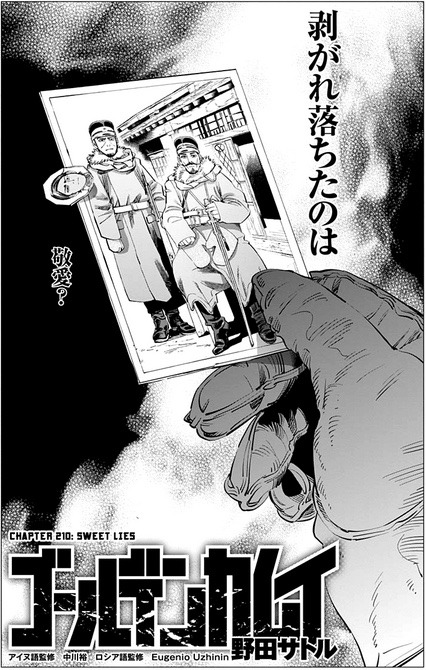
Koito’s right hand holds his photo of Tsurumi and Tsukishima that he had acquired from Tsukishima back in chapter 101.
Recall that he was upset that Shiraishi had escaped and he had also encountered Ogata on the airship who helped in the escape. Tsukishima is in part trying to get Koito to calm down by giving him this very photo.

Looking back at this panel for the first time in awhile, it shows that Koito has a little light in his eyes and he wishes he were born earlier to serve at Tsurumi’s side in the war. Koito immediately has a pre-cut photo of his own head that he wants to glue on over Tsukishima’s and he tells him to make him some rice glue.
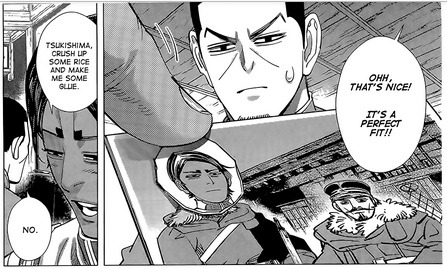
Tsukishima says, no, but based on the title page for 210 he definitely found some glue somehow.
When they were heading to Abashiri, recall that Koito had more doctored photos including this one here:
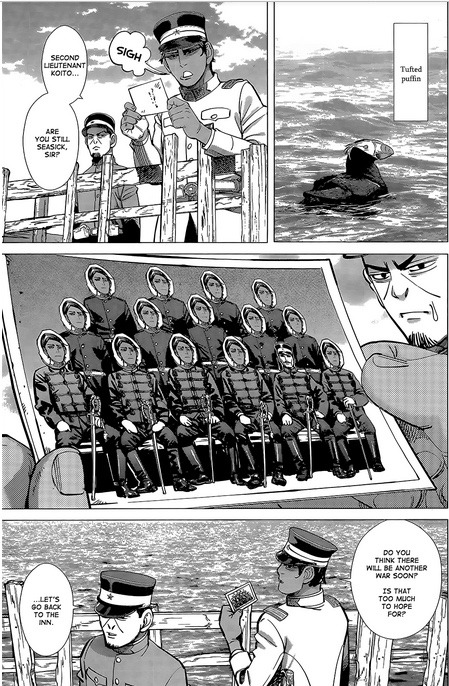
At some point, he got another photo with Tsurumi in it as well as other commanding officers and he added his own head to all of the men in the photo, longing to have had a chance to serve with Tsurumi. Koito pre-photoshop - he was pretty dedicated to making his photo collages!
Now, also recall that this photo has been used for the cover of chapter 147 - Igogusa, where Tsukishima’s backstory and loyalty to Tsurumi was solidified.

Really, all of this is indicating that Tsukishima and Koito are tied to Tsurumi and this photo shows how closely they are tied. I’ll come back to this in a bit. Like some of the other dense and intense chapters, I’m going to jump to the part between Asirpa and Sugimoto, that creates a pause and adds to the tension between Koito and Tsukishima.
The quick and dirty about Sugimoto and Asirpa’s separate paths:
The chapter continues to keep us in the dark about the end of Sugimoto and Asirpa’s conversation after the movies. It is now the night before Tsurumi will arrive in Odomari. Asirpa reminds us that she’s never actually met Tsurumi, she only knows about him through her interactions with everyone else. This really does two things for me as a reader - it seems to speak to unresolved issues between the two and she’s musing what type of man Tsurumi is. Hasn’t she gotten enough information to in part figure this out from what others have said and done? I’m a little surprised by this statement, she saw what Tsurumi did to Sugimoto’s face with those dango skewers.
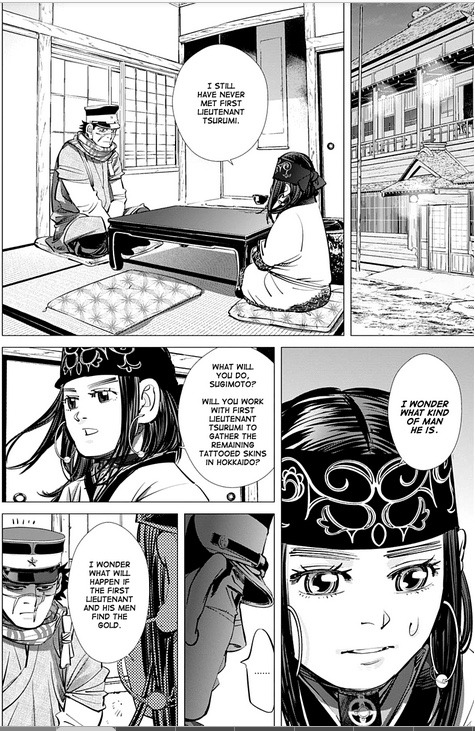
Either way, just like before her encounter with Wilk at Abashiri she’s expressing her concerns about what will happen. She wants to know what Sugimoto will do in the gold hunt? What will Tsurumi do with the gold? Most importantly, what will happen to the Ainu, her community in all of this. Sadly, Sugimoto can’t see the forest through the trees. His current vision on all of this is “Asirpa vision”. As long as Asirpa is removed from the hunt for the gold, it will be alright - she’ll be clean and she can go back home to Huci. As the lovely Merdopseudo has written, Sugimoto is back to his usual habit of “Sugisplaining”, that Asirpa doesn’t need to think about things. Just be good, give up the code and walk away from the gold, the Ainu and just go back home, safe, clean and pure. Kiro told Ogata that Asirpa’s time on Karafuto was to mature her - and it has. I still miss Kiro’s character greatly but he really helped Asirpa see the bigger picture than just her kotan in Hokkaido.
These entire two pages almost fade to the background compared to the rest of the chapter. Their relationship dynamic has changed. Both are holding back now thinking about their own concerns and their goals which have shifted or the fact that Asirpa is gaining a new and different goal. Her new focus is scary for Sugimoto. I don’t think they are being as honest to each other as they should be. They aren’t good at conflict - both are dancing around the major issues involved in this entire gold hunt.
In a way, I like how fucking awkward these two pages are - it really highlights that their reunion wasn’t what either of them expected it to be and that they are currently on different paths. I love this tension - I’m waiting for it to explode.
Now onto the meat of the chapter.
Koito has put the pieces together and his world view is shattering:
The chapter has a lovely two page spread of the harbor at Odomari as Koito asks Tsukishima a question before Tsurumi’s arrival. We first see Koito looking at his photo of Tsurumi and Tsukishima that his face has slid off of. Koito’s brow is very furrowed and he’s really intense looking. I love how the picture of a steamship is followed by his face shaded and more focus in his eyes. Tsukishima makes a comment that Koito isn’t at excited and cheerful as he would normally be about Tsurumi’s arrival. Remember that Koito was in tears as they left for Karafuto as he longingly looked at his Tsurumi bromide!

As Koito speaks to Tsukishima not looking at him, he tells him that Ogata told him something at the hospital in Akou before he escaped. He first mentions the Russian term for bon-bon. Tsukishima’s eyes narrow a bit before he continues on. He goes on to tell him that Ogata (with his face completely shaded in black) tells him that “the next time he meets Lt. Tsurumi . . .” and then he turns to him and looks at him directly (please get some chapstick Ogata!) to “ask him about the Manchurian railway.”
Tsukshima’s reaction is both one of surprise (as indicated by the light burst) and also one of annoyance and stress. Tsukishima has stress lines under his eyes, his cap covers part of his eyes and his face is shaded as he’s only able to reply with “. . . .”

Koito then begins to describe the Manchuria Railway as a concession from the Treaty of Portsmouth, meaning it went from Russian control to Japanese control. This then solidified the Japanese presence in Manchuria under the guise of the expansion of the influence of Imperial Japan and its increasingly aggressive colonial role in the region.
If you have any knowledge of the history of this in the region leading up to the second world war than this doesn’t come as a surprise to you as a reader per se. The important part is what Koito then adds in.
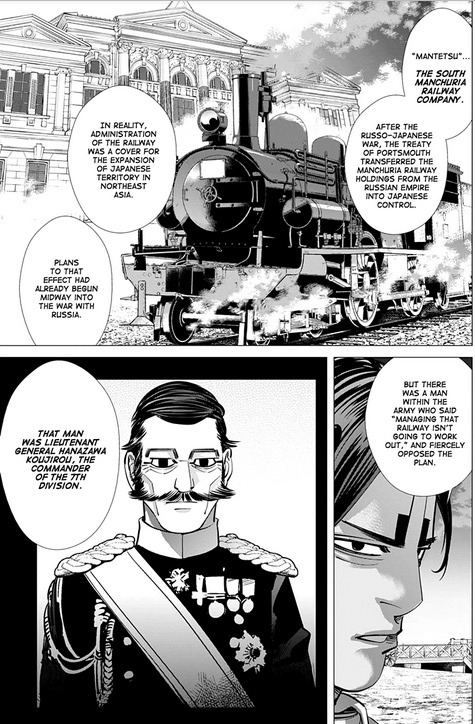
Koito has additional information due to his background; he knows that one member of the army was quite vocal about the whole Manchuria Railway, Hanazawa. He is still a shitty father in my mind, but hey, it looks like as a member of the military and Satsuma elite he did think about things from a strategic perspective. Therefore, Hanazawa was the lone critic about the whole railway situation.
Koito then goes on further to explain that b/c his father was friends with Hanazawa, he also knew about the controversy surrounding the railway and that Koito heard about it in his household. Koito also knows that Tsurumi connects the bodies of their comrades from the Russo-Japanese war will be at rest on Japanese soil and that it should include Manchuria. This was mentioned in the flashback that Tsurumi and Tsukishima had in chapter 150 when both were wounded at Mukden.
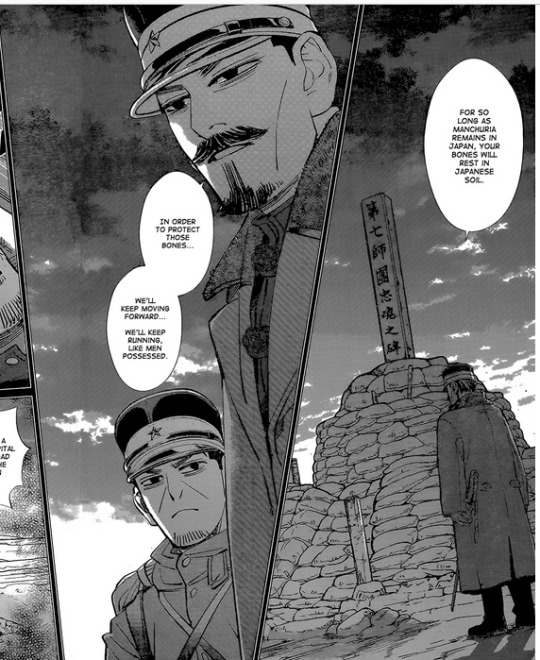
Tsukishima still doesn’t have a response to Koito’s inquiries as he continues to connect Tsurumi’s goals with what happened with Hanazawa’s death. Tsukishima’s eyes are barely visible, his eyes are almost completely obscured by his cap and its shadow. This does NOT LOOK GOOD AT ALL. This looks very concerning and that Tsukishima is thinking about likely bad things. Koito continues forward and very emotionally asks Tsukishima is there is a direct connection between Hanazawa’s death and Tsurumi.
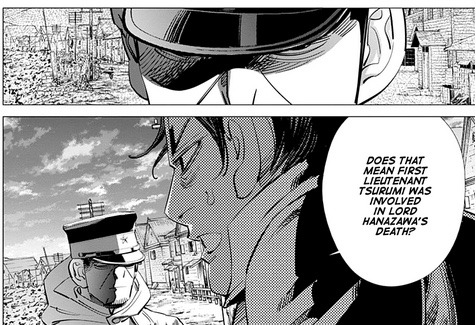
By the time he’s blurted it out, Koito is nervously sweating, his hair is a bit loose and his stress lines under his eyes are intense. He’s almost pleading with Tsukishima for him to not confirm what he’s thinking. Tsukishima looks anything but pleased, his face is deadpan and his eyes are pretty much obscured completely and his face is half shaded.
Koito still doesn’t get an answer from Tsukishima, so he becomes even more emotional, still sweating and gesturing with his left hand for emphasis. He throws out the theory that Ogata wasn’t happy with the fact that central put the blame on the 7th and Hanazawa which resulted in his suicide, so he joined with Tsurumi’s plan for the coup. But since Hanazawa was in the way of the Manchurian Railway, Tsurumi had him eliminated and Ogata found out and defected against him. The then asks why Ogata would tell him that and we still can’t see Tsukishima’s facial expression well!
When Tsukishima finally looks up and replies to Koito his looks are so robotic. His eyes seem cold and even though he’s got stress lines his face is deadpan. He replies that Ogata will say anything to foil their plans and then he turns the conversation around to ask him why he trusts Ogata’s words now. Koito was ready to shoot the wildcat to kill previously - this is a 180 for Koito’s opinion on Ogata for sure.

With great emotion and intensity Koito then says “Barchonok” the Russian term for bon-bon. He flat out states that Ogata was one of the kidnappers at Hakodate. He knows it. Koito is correct and on the money - he’s not backing down and he needs answers now.
The chapter then transitions to the two pages with Sugimoto and Asirpa to build the tension between them. Technically they don’t even get a full 2 pages as Koito and Tsukishima are on the bottom here:
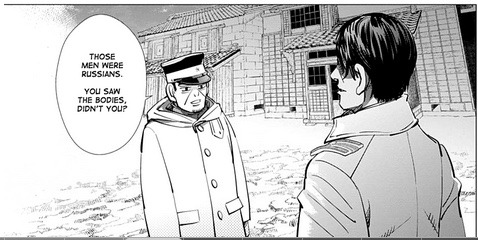
Koito looks shocked when Tsukishima deadpan asks what is clearly a rhetorical question. That the bodies were Russian. Koito was there - he’d know what he saw right? Eh? Eeeeehhhh? Koito looks so shocked at his reply - this can’t be Tsukishima’s answer to him? He knows Tsukishima!
He then asks Tsukishima to confirm that he was one of the masked kidnappers too! Koito is at his limit of patience. He’s so many emotions at once; upset, hurt, confused, sad, angry . . . a man whom he has trusted hurt him in the past all for Tsurumi’s own personal gain.
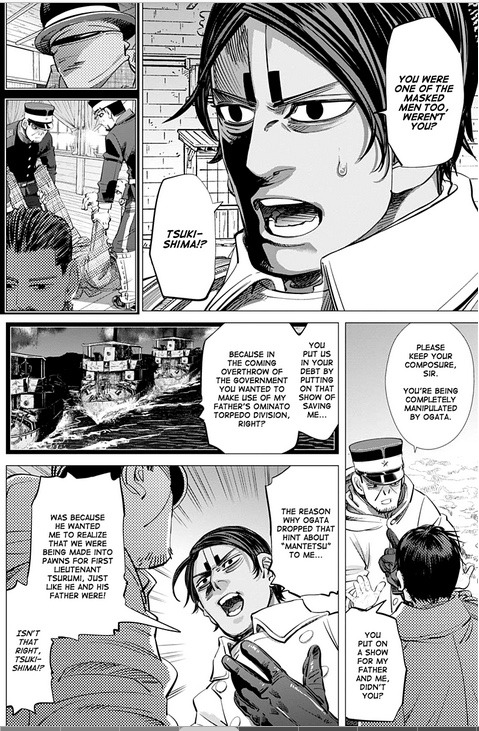
Tsukishima’s reply is still dead pan though now he’s lifted his hands in defense of Koito’s aggressive questioning. He falls back on the idea that Koito, is falling prey to Ogata’s manipulations, while Koito recognizes that Tsurumi made sure he and his father are in debt to Tsurumi. I love the fact that Koito sees that he and father were set up to be used by Tsurumi and so were Hanazawa and Ogata.
With Tsukishima’s reply that it is delusional, Koito forges ahead in his accusations of Tsurumi’s manipulations. Koito then realizes, he’s getting no where with Tsukishima and he’ll just make sure he and his father ask Tsurumi directly. I love this facial expression from Koito! He looks so determined as he’s physically turned away from Tsukishima in a sense giving up on him and moving forward on his own.
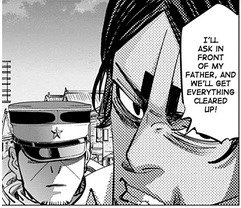
Finally, Tsukishima strikes back stopping Koito dead in his tracks. With an absolutely creepy facial expression, not even looking at Koito directly he asks about the fact that the two of them were saved during the kidnapping. This is such a loaded statement, since it implies that there was a possibility where they weren’t saved!
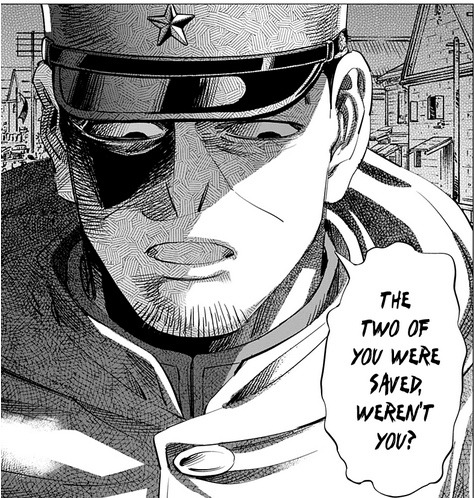
Yes, if Koito and his father didn’t play along to Tsurumi’s tune during the kidnapping, well it implies that the 27th didn’t need to spare them. They could have killed Koito and his father during the process!
This stops Koito. He turns back to Tsukishima with a very uncomfortable “what?” . . . that his brain is trying to process exactly what Tsukishima just said.
Tsukishima then goes on to state that he didn’t realize that Ogata knew of the connection between Hanazawa and the railway. He thought Ogata’s goal has always been to expose Tsurumi and turn him over to Central Command. This is a reference all the way back to his shoot out with Ogata in Yubari here.

This confirms that what Tsukishima told Ogata was his own personal theory behind Ogata’s motivations. I was always curious about it, since I had always though this was something that Tsukishima thought, but I was never sure if this was something Tsurumi told Tsukishima or something that Tsukishima came up with. With the way that Tsukishima describes it to Koito, I will read that this is a Tsukishima theory - not one from Tsurumi. I think this makes sense, Tsukishima worked with Ogata long enough that he thought he had a decent read on him - but as we’ve come to expect - most characters never have a good read on him - they still place their own ideas on him to explain his actions.
This continues with his statement that he can’t figure out what Ogata was unhappy with - that Tsurumi gave him the opportunity to kill his father wasn’t enough to please him?
Koito looks like he’s in a state of shock as he asks for confirmation that Ogata killed Hanazawa as a part of Tsurumi’s plans. His face is covered in sweat drops, his face is shaded he doesn’t really know what to say or do. . . . When Koito was first introduced, he wanted to know why Ogata would betray Tsurumi with his father’s death under the pressure of central command.

Tsukishima doesn’t even stop to confirm or deny this, he just keeps talking deadpan in expression. He simply states that he was tricked as well and by a very elaborate ruse. Tsukishima is just short of saying that Tsurumi must have manipulated Ogata into killing Hanazawa or making him believe that this is something that he would want to do . . . . He can’t outright say that Tsurumi manipulated Ogata to do the actions he’s done - instead, he goes on to state that he was deceived as well.
This seems to indicate that there must have been something between Ogata and Tsukishima - he’s done many terrible things for Tsurumi, but he’s still almost judging Ogata actions as different than his.
Anyways, back to Tsukishima’s poor explanation for Koito - he leaves out a lot of information that we will remember from chapter 149-150 and instead jumps into state that he met another man from Niigata, Sado in particular in the field hospital during the battle of Mukden, when he angrily then approached Tsurumi but still protected him when they both were injured. Only much later did Tsukishima realize that there was no way for him to bump into a member of the 2nd, the division that he and Tsurumi were in during the Sino-Japanese war.
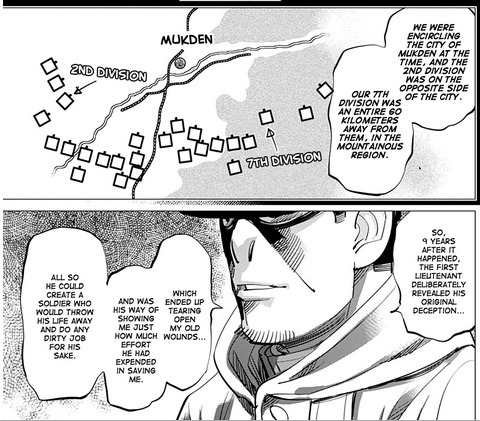
Therefore, that man was a plant by Tsurumi to test his loyalty to Tsurumi and his future plans to go after the Ainu gold. Tsukishima freely expresses to Koito that Tsurumi molded him into the perfect right hand man for him. He went to a great length to shape Tsukishima and that Tsukishima would do whatever he asked.
The scariest part is how Tsukishima has accepted this. And it all makes sense how despite working hard and being a dependable individual, that he never seemed to break away from Tsurumi’s influence on Karafuto.
This entire panel haunts me. Tsukishima is stating that he sees no value in his own life. He’s accepted the fact that he is totally fine with what Tsurumi has done to him. He won’t even bother getting upset in the first place b/c his life has had little value to begin with. Therefore, he will follow Tsurumi’s plans to help the 7th.

Most importantly, when a completely wrecked Koito is finally able to ask him if that is all of Tsurumi’s goals - Tsukishima can’t look him in the eyes to reply. Just that Tsurumi’s specialty is “saving people with “sweet lies”.” and that he has no idea with his final goal is.
This implies that Tsukishima sees himself as “saved” by Tsurumi and therefore he owes him for his life. If the reader still takes Tsukishima’s Igogusa flashback at face value and he killed his father and it was of Tsukishima’s own free will that it happened - it returns to the idea that Tsukishima sees himself as a dead man walking and that he’s using his borrowed time to serve Tsurumi.
I can’t help (along with many other readers) wonder if Tsurumi manipulated Tsukishima into attacking his father so that he could “rescue” him from prison and created loyalty by killing his father. I mean it is clear that is the method he used with Ogata in 103.
Koito tries to get an answer from Tsukishima on why he’d continue along with this, but Tsukishima simply states it is better to align oneself with an individual with grandiose plans. In the most detached way possible with a blank face, he states his true desire is to watch Tsurumi’s manipulations all the way to the end. He seals his fate of going down with Tsurumi like the loyal right hand man that he was molded to become. Free will isn’t a Tsukishima thing.
He then finally states that Koito must keep all of this information to himself as Koito is sweating, breathing heavily and literally on the verge of a panic attack as he warns him that Tsurumi will kill him and that Tsukishima will be the one to do it.
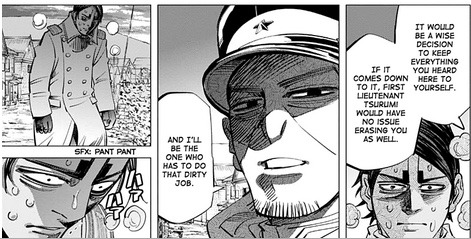
And keep in mind. Despite how respectable Tsukishima may look, he’s the man who shot Captain Wada in the head at point blank range! Wada commands Tsukishima to fire at will, to which he replies yes and shoots Wada instead of Tsurumi.

Tsurumi then mentions Manchuria to the rest of the men of the 27th present when this happens.
Okay, back to the current chapter.
It zooms out to Koito leaning forward, panting as his knees are beginning to give out. To me it looks like he’s about to have a full blown panic attack. Readers are used to Koito as being overly dramatic, and he drops to his knees declaring that Tsurumi is amazing. His fingers are contorted and he looks stiff when he’s on his knees as his eyes almost roll up into his head.
He’s sweating and blushing all over his nose and face, something that we haven’t seen on him before. He can’t help but scream out that he’s pleased that Tsurumi wanted him to join him so badly.
He does his usual overly dramatic prostration but then spins on the dirt as he declares how impressed he is as being a part of Tsurumi’s plans.

Tsukishima just watches him from afar as this happens.
Thankfully, Sei Kobiyama on twitter was able to point out a key point during this scene. Usually, when Koito had a meltdown, he would end up expressing himself in his local Satsuma accent - thus making his screams unclear to the reader and those around him.
This time, when Koito becomes distraught, his understandable accent is maintained, as mentioned here:

This is a linguistic change that Koito no longer sees Tsurumi as his saviour and someone to look up to - instead, he’s a man who will go to great lengths to get men to serve him loyally.
The chapter then ends with Tsurumi and the 27th arriving in Karafuto. Both Usami and Warrant Officer Kikuta are with him. Usami’s face is obscured so we can’t see his eyes and he’s likely pleased while Kikuta looks a bit sad. He’s likely torn between the recent events in Noboribetsu with Ariko and serving Tsurumi.
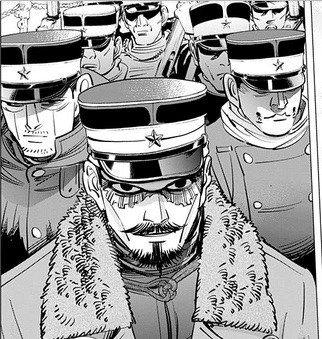
This was one hell of a chapter!
What are the major take home points from this:
Koito’s innocence is lost.
With Ogata’s hints, Koito has realized how much of his life has been influenced and manipulated by Tsurumi. Encountering Tsurumi in Kagoshima when he ws visiting his brother’s grave. Spllling out his feelings to Tsurumi a nice and pleasant man in 1900. How the entire kidnapping was to make sure Koito and his father would fall into line with Tsurumi. He gained access to the navy (necessary for defending Hokkaido from the main island in the event of a coup) and also gained a talented but unwavering subordinate in Koito.
Koito was raised to be an ideal 2nd lt. for Tsurumi - much better than the very annoying and rule following Yuusaku. With how elaborate Tsurumi’s scheme was to get Koito to worship him, it makes it even more clear that Yuusaku would have be the largest impediment to Tsurumi’s goals with the 27th. In this chapter, Koito tells Tsukishima that he’ll call Tsurumi out in front of his father - I am not 100% certain that Yuusaku would have done the same thing - we know he was a rule follower to the end and I wonder if Yuusaku may have said something to a similar effect. Or the idea that Yuusaku if left alive would also run to his father to expose Tsurumi’s plans. Whatever the background with Yuusaku - it was clear that he was a non-manipulable individual.
Some people may have thought he faked things or was spazzing out at the end of the chapter - I read it that he’s in part now aware of what he should say but at the same time his own viewpoint is so shattered that it comes out as a bizarre mix of drama, comedy and horror. The best way I can approach it is from personal experience. Where something happens and you just don’t know how to react so in part you are almost laughing but crying at the same time but you are a total mess of emotions and it becomes overwhelming.
If we stop and think about it - Koito was manipulated since he was 14! 14! This is horrible and he’s digesting this in his early 20s now. Not like this woudln’t upset him at all? Furthermore, this is all from Tsukishima, a man who he looked up to and felt like he knew and trusted. Sure, Koito could be rude with him, but this is the man who carried him to a dog sled, who placed him on the sled gently and protected him from Kiro’s explosives. All of Tsukishima’s actions benefited and protected Koito. To have that same person threaten to kill you. Well, that would be a total emotional mindfuck.
This is setting up an interesting dyanmic between Ogata and Koito. With the flaskback to the kidnapping, it was Ogata who patted Koito on the back while Tsukishima held back. Ogata didn’t need to be nice to him but he was. Both men were ignored by their fathers for a “favored” brother. Once was legitimate despite being younger while the other was older and was supposed to carry on the family honor. At one point in time, Koito and Ogata were not seen as useful by their fathers. Tsurumi’s actions got Koito’s father to notice him, while nothing Tsurumi did, could get Ogata’s father to notice him.
I am comfortable enough to throw out the idea that Ogata is acting like an older brother to Koito. Not an amazingly great older brother, but at least as one who is giving him enough information to see what is happening and maybe change things. Koito’s older brother was kind and had very pale skin tone as shown here from young Koito vision.

We see a sparkle of light in his older brother and the old idea is that he was a very good older brother to Koito.
Ogata is canonically referred to as being usually pale - most obviously here by Shiraishi.

Ogata does not like involving innocent individuals in schemes - when Koito was younger he was still innocent - enough that kidnapper Ogata would be kind to him.
You could try to write this off as Ogata being an agent of chaos - but agents of chaos don’t have a soft spot for innocents. We know that Ogata has a whole hang up on innocence and purity in the context of those who commit atrocities and who can wipe their hands clean of them. But, since Koito is a military man who has dirtied his hands, he’s already someone that Ogata can relate to much better than Yuusaku.
The bonus of this, is that Ogata can deal a blow to Tsurumi’s plans by releasing Koito from his control. Ogata in addition to his obsession with finding a blessed path, is one of exercising free will. This may explain why he was upset at Wilk’s role to set Asirpa up as an idol for the Ainu - she does not have her own free will to decide and she was too similar to Yuusaku.
Thankfully, their showdown in the ice floe really helped to shift some of her thinking in addition to Kiro’s death.
Can the tiger’s curse be Koito having to face his own actions and choose a free will in the 27th? Realizing that he is tied to the lynx, Ogata and that the two men have much more in common than Koito already knows in regards to their fathers’ friendship? I think Ogata even respects the fact that Koito is an intelligent man, just that he didn’t apply himself. He was able to easily catch up to his peers to pass the military exams so Ogata was likely banking on his intelligence to connect the few bits of information that he left Koito with before escaping. I personally really want Koito to break away from Tsurumi and team up with Ogata. I think Ogata is working with the partisans and if Ogata re-appears, Sofia will be with him and Koito can talk to Sofia (still banking on both of them bonding by talking in French).
Is there any “hope” for Tsukishima?
Oh man. This is a hard summary for me here - I love Tsukishima. When the action moved to Karafuto, I really fell in love with his character more. I have a meta about how upstanding and respectful he is as a character to others. He did what was expected of him, made sure Svetlana told her parents what happened, helped up a Russian guy he knocked down in the stenka and kept having all of these “soft” nice guy moments.
But what began to worry me was his lack of doubt at things. Koito seemed to be more open to questioning what was happening. He told himself to shoot a thieving cat on sight - that he had to tell himself facts about Ogata to make sure he’d capture and kill him. Meanwhile, Tsukishima remained silent. He relayed facts to Sugimoto about the wildcat nickname but he never said anything to get Sugimoto more riled up or less upset by Ogata. He just did what was required of him.
He only became pushy once they reached Toyohara where they were to wait until meeting up with Tsurumi in Odomari (next chapter?). It is almost as though Tsukishima is a example of the trope that one should be worried about the “normal” ones. He has done his job always with benefiting Tsurumi in the end. He’ll now follow him to the end even if it means he dies alongside with him.
Noda called him the conscience of the 7th back when he made the character guides at the beginning of the tankobans. I am beginning to wonder if his conscience is more of the fact that Tsukishima will express a moral doubt or concern only to still follow orders?

I can’t help but look at these eyes here, here he blankly tells Koito he’s fine with his situation in 210.
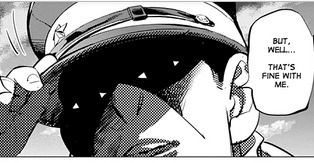
Are similar to Ogata’s in chapter 103 to Hanazawa.
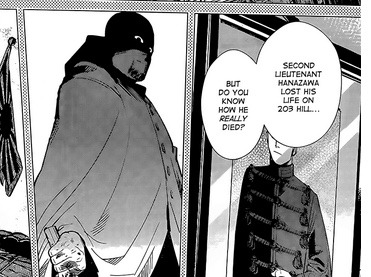
Both express the emotions - or lack thereof of men who are doing horrible things that are clearly harming them but following through on those actions b/c Tsurumi is leading them to that.
For volume 15 Noda expanded chapter 150 to include how Tsukishima let go of the lie that kept him tied to Tsurumi from the end of the Sino-Japanese war until the Battle of Mukden.
Special thanks to @goldenkamuyhunting for these edited images of the volume version.
While in Otaru, Tsukishima goes out alone in the evening. He reveals that he’s held onto Igogusa’s hair all these years. He is a dark figure against the lighter buildings in the harbor.

He pulls the hair the Tsurumi had given him that was folded between some well worn paper, that may even have some of his blood stains on it, indicating he kept it close to his chest when he was in battle.
He stands on the edge of the harbor and holds the open paper in his left hand, the hair in his right as his eyes are completely covered with his hat. There is a slow motion opening of the right hand as it releases the hair so that it almost slides out. Not throwing or anything active. A passive release of the hair back into the ocean, depicted as a black abyss.

We get his own view as the hair falls out of his hand and into the water to dark to see any details of.
As the hair falls into darkness on the next page we see Tsukishima walk back to the 27th barracks and he enters the back of a room full of men. The two page spread shows Tsurumi removing his bandages in front of his men and the introduction of his face shield.
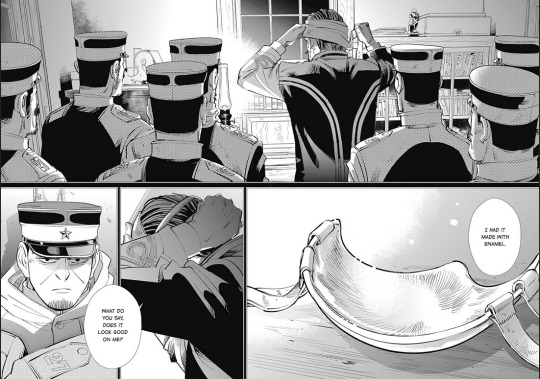
Tsukishima watches all of this from the back of the room deadpan. He has let go of his ties to his past and his love of Igogusa. All that remains is his loyalty and devotion to Tsurumi.
This is it. This is the point when Tsukishima dedicated himself full to serving Tsurumi. He’ll follow him straight to hell if that is how things go down.
In some ways, I’m having a hindsight is 20/20 moment in regards to Tsukishima. The entire time on Karafuto, Tsukishima has been relatively quiet. He’s done what he was supposed to do and other than his emotional outburst with Svetlana, he’s been very tight lipped and silent. This is a parallel with Ogata who was keeping quiet to not reveal his skills in Russian. Tsukishima hides his devotion to Tsurumi through his banal and normal actions. He doesn’t give us much to go on, it is easier for him to show nothing - by showing nothing or slight annoyance, others can’t get a read on him.
I would argue that Ogata is much more emotional and it shows on Ogata’s face much more than Tsukishima’s. His default is to have a blank face when wants to cover, Ogata’s eyes frequently betray his emotions. They are subtle but his are more obvious that Tsukishima’s.
What all does this mean for the future?
I am still under the indication that Koito will break away from the rest of the group.
I’m still hung up on this image from the end of 180. We now know that Tsukishima will follow Tsurumi to the end. Tanigaki has no problem following him as long as he doesn’t have to return home. Sugimoto sold out Asirpa for 200 yen to Tsurumi.

Cikapasi and Ryu stayed behind with Enonoka and her grandfather. Koito stands separately. I thought maybe he’d end up with Enonoka and her grandfather after he found out about Tsurumi. That could still happen but what if Enonoka and her grandfather are a stand in for Asirpa and Huci and maybe Retar?
He would still be aligning himself with the Ainu, just Hokkaido Ainu versus the Karafuto Ainu.
I want to know what makes Tsukishima different from Ogata? Both men were involved in the kidnapping of Koito. Tsukishima continues to come back to Tsurumi despite that he’s in an abusive relationship. Ogata snapped at something and couldn’t do it anymore?
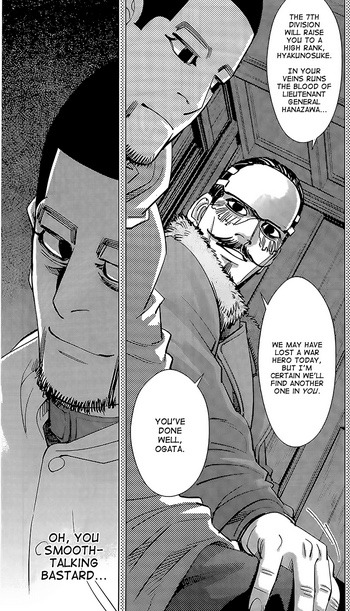
We know he doubted Tsurumi when he had him kill Hanazawa. What was it that pushed him over the edge? Why has Ogata escaped while the rest remain loyal to him. Granted some of the men are less intelligent than Tsukishima, Koito and Ogata, but the smart ones see what his happening. Is Kikuta also in this group of the more intelligent Tsurumi inner circle. So far he’s proven himself to ge a quick witted and smart guy.
What happens if things begin to unravel? How does Sugimoto think he can get out of this one? The only reason he was able to escape Tsurumi the first time was with Asirpa and Shiraishi’s help and Tsurumi letting him go. Now, he’s handing both Asirpa and Shiraishi into Tsurumi’s control - he won’t be able to rely on them being on the “outside” to help him.
Furthermore, Ogata demonstrated that if one escapes (as with Tanigaki in Kushiro) you escape before your watchers get close to the deadline. The earlier you escape the better since they will become more attentive. I’m sure Ogata learned this from Tsurumi and Tsukishima will know this.
Sorry I don’t have much more for you guys. I’m still mulling things over and I’m re-adjusting to my work schedule so that will throw me off for a bit more.
#golden kamuy#golden kamuy meta#koito otonoshin#koito heiji#tsukishima hajime#tsurumi tokushirou#asirpa#sugimoto saichi#ogata hyakunosuke#kiroranke#hanazawakoujiro#hanazawayuusaku#Igogusa
78 notes
·
View notes
Video
youtube
ECP0736 X-tal Party at 281 Frederick Street 01/20/06, Cam 1 (Davis)
Ear Candle Productions captures X-tal playing a party in SF, 1/20/06. In 2006, the Rickshaw Stop hosted a series of shows reuniting old bands from the 1990s San Francisco scene. X-tal, the Catheads, It Thing, and the (Ex) Cat Heads all reformed to play together on January 21, 2006. Also, all four bands played a party at our headquarters on 281 Frederick St. the night before.
Here we see X-tal's set at the house party, caught by Davis Jones on Camera 1. The reunion lineup of X-tal consisted of J Neo Marvin on vocals and guitar, Jimmy Broustis on guitar and vocals, Mark Zanandrea on guitar, Alan Korn on bass, and Mick Freeman on drums and vocals.
Song list: STATING THE OBVIOUS AGAIN CENSUS GOOD SHEPHERD ENCORE RAGAMUFFIN GIRL WHITE RAT FIVE LEGGED SPIDER WINDBAGS MORE FUN IN THE NEW WORLD ORDER PABLO UNION SUNRISE BASICS 101 AN OLD COLONIAL'S HARD LUCK STORY BLACK RUSSIAN
Ear Candle Productions is a small music label, video production, and eLearning website designed to be a place for the arts to stay and to be a venue for the creative products of the owners, John Bassham (AKA J Neo Marvin) and Debra Nicholson Bassham (AKA Davis Jones). We live in San Francisco. Come visit our website, check out our YT, Bandcamp, Ear Candle Radio, and other pages at https://earcandleproductions.com
0 notes
Text
History thought: I see a significant parallel between the Aztec empire and Nazi Germany: both took a pre-existing nasty part of their region’s culture (human sacrifice in the case of the Aztecs, racism and eugenics in the case of the Nazis), doubled down on it in more-or-less the most horrific possible way, and built an entire imperialist ideology and state apparatus around it.
Context for that: I don’t know much about pre-Columbian MesoAmerican history, but from reading 1491 and 101-level histories about the Aztecs I have a strong impression that Aztec human sacrifice practices were intensified a lot as part of the process of their society becoming an empire, with a new imperialism-friendly theology providing the justification. Human sacrifice seems to have been part of the cultural background of pre-Columbian South and Central America, the Inca did it too, but I have a strong impression that the Aztecs were unusual in how central human sacrifice was to their state and how much of it they did. I see a parallel between that and what happened with racism and eugenics in Nazi Germany.
Thought proceeding from that: therefore, arguably, the best modern analogy for Cortez’s conquest of the Aztecs would be evil aliens invading an alternate history Nazi victory timeline Earth.
Thought also proceeding from that: I wouldn’t be surprised if other pre-Columbian South and Central American societies have something of an undeserved bad reputation just because the Aztecs are one of the three pre-Columbian South and Central American societies the average person has heard of. Like, imagine that scenario where aliens invade and conquer a Nazi victory timeline Earth; now imagine the history books the aliens might write about pre-conquest Earth society hundreds of years later, imagine what their historical fiction and popular history books about pre-conquest Earth society might look like, imagine what their equivalent of PBS documentaries about pre-conquest Earth society might look like, imagine their pop-cultural memory of pre-conquest Earth society. Imagine how all that might be skewed by a Europe-dominating Nazi empire being one of the three or four pre-conquest human nations the average alien is familiar with.
Speculative fiction concept: a fake history article or book or book review article from a universe where aliens conquered a Nazi victory timeline Earth in the 1950s, written hundreds of years after the conquest in a time when the alien empire has been reformed into a sort of Star Trek United Federation of Planets type set-up and Earth is a thoroughly culturally assimilated member of the aliens’ federation and the aliens have come to regret their earlier imperialist ways. The book or article is basically discussing the political and cultural context in which Nazism existed and its place in that context, with a subtext that it’s trying to show that the Nazis were unusually murderous and cruel within that context and it’s trying to debunk a common historical misconception that pre-conquest Earth culture was just like that.
Speculative fiction concept addendum: possible bonus material: examples of the sort of media that book or article would be reacting against, e.g. an elementary/middle school level textbook chapter about Earth history where there’s a handful of paragraphs about pre-conquest Earth history, a bunch of writing about the military campaigns to conquer the United States of America and the Nazi empire written in a queasy tone of being low-key ashamed of the brutality of the conquest but also horrified at how nasty the Nazi empire was (the conquest of the rest of the planet is described a short footnote paragraph), and the rest is the history of Earth under the Empire and then as a member of the Federation.
Speculative fiction concept addendum: bonus material about uncomfortable implications: some writing about anti-colonial movements on Earth during the late Empire period. Mentioned in passing is that Earth anti-colonial movements often tried to reclaim the Nazis and their iconography (in much the same way that supporters of Hispanic and American indigenous rights in our world often try to reclaim the Aztecs). These attempts at reclamation included revisionist histories that suggested the Nazi empire wasn’t really as bad as conventional histories claim, “the Nazis were brave warriors who heroically resisted the conquest and you should take pride in this noble heritage!” takes, and adoption of Nazi iconography as symbols of resistance, liberation, and cultural pride. Ironically, many of the people “reclaiming” the Nazis in this way were or are people whose ancestors were victims of the Nazis; when Human/alien has been the most important racial distinction for centuries “you’re a Russian Jewish autistic trans gay, the Nazis would literally have wanted to kill you for five different reasons and probably did kill, enslave, torture, and/or rape your ancestors!” tends to get lost in the shuffle of “I’m going to take pride in the cultures of my ancestors that the conquerors spent centuries trying to wipe out!” Uh, yeah, this is totally the sort of thing I could see happening in this scenario, but I think it’d probably be kind of uncomfortable to write or read, probably not something to talk about in much detail unless one can handle it with a sensitivity I’m not sure I’d be capable of.
#history thoughts#writing ideas#alternate history#cw: nazis#I feel like this post should have a content warning but I'm not sure what
7 notes
·
View notes
Text
Days 12-15: Taiwan
In a way, this trip has been on a slowly increasing scale of travel difficulty for me. Japan, while still foreign, is like a warm blanket—familiar, safe, and clean. Korea is one or two steps beyond Japan. Still safe, but less familiar. Taiwan is three steps out. It's still very safe, but, for lack of a better word, it's also China. Wild, chaotic, exotic China.
Hordes of scooters weave through every street, big impenetrable Chinese characters dominate every sign (though there's still English secondary signage everywhere you really need it), and everything is considerably less spotless and immaculate than Korea, let alone Japan. To speak in Dungeons and Dragons character alignment terminology: if Japan is Lawful Good, and Korea is Lawful Neutral, Taiwan is Chaotic Good. There's still that East Asian order ethos, but noticeably less than the first two countries I visited on the trip.
None of this is an insult, mind you. It's also jaw-droppingly scenic, filled with fantastic food and incredibly friendly people.
On Tuesday, after finishing my last entry here, I hopped on the subway out of Seoul. About an hour later, I arrived at Incheon International Airport.
Incheon deserves special mention here. I didn't get a good look around when I arrived there last Friday night, but it's a really really surreal place—ultramodern, and dripping with the trappings of the international set. In Terminal 2, there's a three-story Chanel store and a three-story Gucci store right next to it. There's every conceivable designer boutique, at least 4 duty-free cosmetics stores, 3 liquor stores, 2 tobacco stores, and 2 nondescript "fashion" stores that sell clothing from brands not prestigious enough to warrant their own storefronts (but pricey enough to benefit from duty-free savings). For actual airport souvenirs, though, it's not much. For my 4 days in Korea, the best I could manage was a fridge magnet. Note to self: buy souvenirs outside next time.
After some kimchi stew and an impossibly small $8 airport beer, I boarded my flight to Taiwan. It took about 2 hours, during which time I watched about 70 minutes of Quentin Tarantino's "Once Upon A Time in Hollywood" on a hilariously low-resolution seatback display. My seatmate was a middle-aged Russian woman with two brand-new iPhones who drank five glasses of white wine and bought three sticks of Burberry lipstick from the duty-free cart.
After clearing customs, I hopped on a city bus into Taipei proper. The buses in Taiwan also deserve special mention here for being one of the most chaotic elements of the whole experience. Inexplicably well-appointed with little frilly lace window curtains and headrests, and consistently driven with a style I can only describe as "New York Cabbie on speed," they're an experience in their own right.
The trip to my hotel took about an hour, at which point it was well past midnight. After a requisite post-airport shower, I fell fast asleep.
I'm staying at the CitizenM Taipei on this leg of the trip, a part of a larger chain of hotels that I've stayed at before in New York. It's one of those trendy hotel chains marketed towards young people that tries painfully hard to be cool with every aspect of their branding. Still, their actual hotel rooms are very nice and well-appointed.
The next morning, after coffee, some scallion pancakes, and Taiwanese sausages, I headed over to Xiangshan. Located on the other side of the city, it's a hiking trail that offers unrestricted views of Taiwan's most internationally-famous attraction, Taipei 101. While taking some photos at the top of the trail, I struck up a conversation with a local—a girl about my age who currently lives in London, back here for two weeks visiting family. We talked for about half an hour, exchanged information, and went our separate ways.
After the hike, I headed back into the center of town and hopped on a train out to Jiufen. One of Taiwan's most photogenic locales, it bears a striking resemblance to the Spirit World from "Spirited Away," one of the best/most influential anime movies of all time, and a personal favorite of mine. The train only got me most of the way there, so I had to transfer to a bus in Ruifang, a little village about 3/4 of the way between Taipei and Juifen's iconic old town.
A highlight of the walk through Ruifang—at one point, I passed an elderly Chinese man sitting on a bench. He gave me a thumbs-up, I gave him a thumbs-up back, and he smiled and said, "good!"
One more chaotic bus ride through a series of winding mountain roads later, I arrived in Jiufen. After almost 20 years of being associated with one of the most popular movies of all time, it's more than a little touristy, but a whole lot of fun. The photos to follow will do it more justice than I probably can here. If you like stunning jungle mountain scenery, charming small-town vibes, and excellent food, it's a must-see.
A nice thing about visiting Taiwan right now: for some reason, all Mainland Chinese people are banned from visiting the island by the Communist Party until next year. As locals tell it, I basically have the place to myself.
Also, for about two weeks in advance, rain was predicted for three of my four days here. Obviously, on paper, Taiwan is the most outdoorsy leg of this trip, which is why I spent my first day so actively outside when the weather proved sunny.
In an extreme stroke of luck, though, it was clear and sunny the whole time I was there.
On my second day, I took full advantage of this. After more scallion pancakes and coffee, I hopped on a train out of Taipei Main Station headed out of the city, this time to Tamsui, another small town located north of the city.
One thing I didn't know about Taiwan prior to this trip: it used to be a territory of the Dutch East India Company during the 16th century. One of the most tangible remnants of this period is still on display in Tamsui, a colonial fort known as Fort San Domingo (the Dutch took it over from the Spanish, some of the first Europeans to reach the island during the European Age of Exploration). The Chinese locals know the fort by another name: 紅毛城. In English, this translates roughly to "fort of the red-headed ones," which I'm still getting a big kick out of. Apparently the Dutch were the first redheads the Taiwanese had ever seen, and the nickname "Ang Mo" (literally "red hair," or sometimes more derogatorily, "red fur,") stuck for some time after that as a catch-all term for Europeans in many parts of Southeast Asia.
While there's a decent amount of foreigners in Taipei, I definitely felt like the odd Ang Mo out in Tamsui, wading through street markets and ducking out of the way of scooters. It's an amazing place, filled with life and chaotic energy in a way few places I've ever seen are.
Later that day, I returned to Taipei to check off one of the obvious must-sees of any Taiwan visit: Taipei 101. Formerly the tallest structure on earth, and now the 11th tallest behind a variety of Mainland Chinese and Gulf State money laundering projects, it's truly a sight to behold. From the 89th floor, you get an unrestricted panoramic view of the whole of the Taipei metro area and a glimpse into the building's highly sophisticated internal stabilization system. Because Taiwan is prone to earthquakes, the 101 is borderline over-engineered against any conceivable emergency. It's allegedly one of the most stable structures on the planet.
After a beer at the top floor lounge, I headed over the Chiang Kai-shek Memorial. The leader of the Kuomintang and father of the Republic of China, he's a very very very big deal here. His memorial is every bit the equal to monuments like the Lincoln Memorial and is guarded by a group of very very very very serious Taiwanese soldiers. There's a guard-changing ceremony a few times a day that I was lucky enough to catch the end of during my visit. Video will follow.
After that, I met up with my new friend from yesterday and a few of her local friends for dinner. Naturally, the best way to try the best food in a foreign place is to make friends with locals.
The next morning, I crossed the final box off my Taiwan list: the National Palace Museum. When the government of the Republic of China fled the mainland in the 40s, they took most of China's artistic and cultural heritage with them from the Forbidden City in Beijing: over 70,000 items now stored in a sprawling gallery just outside Taipei. It's considered to be one of (if not the) finest collections of Chinese art on the planet, and it's where I spent most of my last full day in Taiwan. Pictures will follow and again will do more justice than I ever could. The sheer extent of China's history is really and truly staggering. The second oldest civilization on the planet, and the oldest continuous one, with a mind-blowing amount of art and culture to show for it.
After the museum, I went back into town for a lunch of pork belly with buns, Dan Dan noodles, and fried pork dumplings. They're big on pork here. The other part of the whole "thousands of years of history" thing? The food. Unbelievable.
I got even more of that aspect of Taiwan's culture later that night when I went back out with my new Taiwanese friend to one of Taipei's famous night markets. Another "chaotic in the best possible way" experience, you can get everything from knockoff designer socks to steaming bowls of beef tendon stew there. By the end of the night, I had both.
This morning, I got up at around 9:30 and had my last helping of local scallion pancakes for the foreseeable future. I checked out around 11, and one chaotic Taiwanese Citybus ride later I was at the airport. More pork and rice, a beer, a three-hour flight, and I find myself at Hotel Nikko Narita, the last stop on my trip, for a quick overnight before my flight home. Expect more in the coming days in terms of a cohesive "final thoughts" piece. But for now, here's a few things I'm already feeling very clearly:
There's a power that comes with solo travel. A sense of self-assurance and understanding you really don't get from many other experiences. You're spending a lot of time with yourself. For some people, the thought of that is terrifying. Especially on the other side of the world. For me, though, it's energizing and self-actualizing in a way few other things could ever possibly be.
What else. Travel. Of all the places I visited on this trip, Japan is still quite easily my favorite, and I'd still love to live here someday. But I'm not in any rush, and I certainly won't be coming home with the same misplaced urge to return immediately that I had after my last trip.
Two weeks really remains the ticket for this kind of trip. I've been away long enough that traveling almost feels like my routine at this point, pretentious as that may read. It's nice to be able to spend enough time doing something that you're able to drop the mindset of normal day-to-day life for a while, and do Big Thinks About Life Stuff. However, as I've said in previous posts, I think I'd need a concrete reason to be here to stay any longer. After almost 16 very full days on the other side of the world, thousands of miles away from my own, I'm actually very ready to come home. I miss my friends and family (you, reading this, probably), and after 2 weeks of near-nonstop movement, the creature comforts of my apartment will be mighty nice.
For now, thank you all for following me. I'm honored to have shared this incredible experience with you.
1 note
·
View note